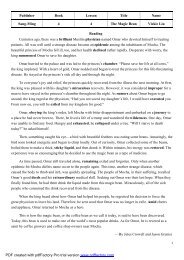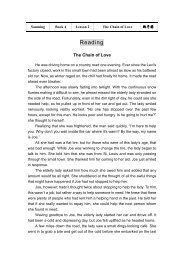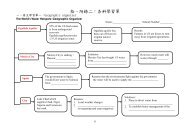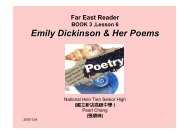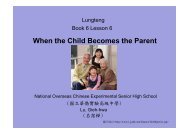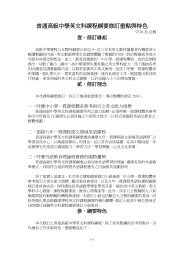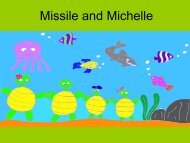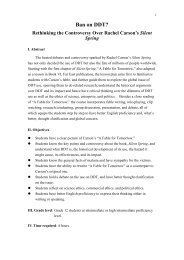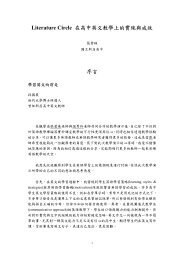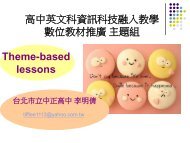教案
教案
教案
- No tags were found...
You also want an ePaper? Increase the reach of your titles
YUMPU automatically turns print PDFs into web optimized ePapers that Google loves.
莊 雲 翔 Stephen Chuang國 立 金 門 高 中 Kinmen Senior High School“The Teacher Who Changed My Life”Book VI Unit 10, Sanmin PublisherIntroductionThis lesson plan “The Teacher Who Changed My Life” aims mainly to equip studentswith the ability to reconsider what a teacher means to students. Students will read a storyconcerning how a teacher’s efforts have changed her student’s life from the student’sperspective. By reading this story, students will be able to relate the moral of this story totheir own experiences and be encouraged to think of at least one teacher who has meantsomething to them in their lives.This lesson plan is composed of task-based activities where students will be engaged inteamwork, discussion and presentation.In section I, students will first watch a video clip and they will be required to think aboutwhat a “good” teacher means and what qualities a “good” teacher should have. They willhave to discuss and share in class.Next, students will learn to use a graphic organizer (GO) to help them grasp the mainconcept of this story. By filling in the blanks in the GOs, they will be trained to sharpen theirskimming skill. After obtaining a rough idea of the story, students will be assigned a differenttask to learn more about the story in detail. In this task, students will be divided into severalgroups and each group will be given a designated amount of time to interpret their assignedpart of the story into Chinese and have to retell the story onstage. We hope that with the GOand the story-telling activity, students will be motivated and acquire a clear picture of thestory.1
In Section III, students will learn to use new words and phrases in the sentence-makingactivity and learn a sentence pattern in context. I will also offer the origins, the correct usages,the derivative forms, synonyms, collocations and idioms to the new words.In Section IV, students will need to write about a teacher who has meant something tothem and they are encouraged to use in their writing the words and pattern they have learnedin this lesson.Objectives1. Students will critically think about what teachers mean to them by reviewing the pastexperiences2. Students will learn skimming skills to grasp the main concept of the story with the help ofa graphic organizer3. Students will learn to tell a story onstage4. Students will learn new words and their proper usages through sentence-making activities4. Students will learn to cluster ideas before they really start writing a passage5. Students will be able to write a short essay to express their gratitude to a teacherStudents’ LevelTwenty third-year students. Their English level is Intermediate (PR 60-90). Five or six ofthem have passed the preliminary test of GEPT Intermediate.The Genre of Lesson:Narrative. It is a story about how a teacher changed a student’s future.Materials1. A video clip (Les Choristes: http://www.youtube.com/watch?v=xPnF6sJAjZs)2. Worksheets3. Computer and Internet2
4. Powerpoint file5. PrizesClasses Needed: This lesson plan will need 6 sessions of 50 minutes.Class Content Time1 MotivationGO2 GOStory-telling50 mins50 mins3 Explain the story in detail 50 mins4 Explain the story in detailVocabulary5 Sentence PatternPre-Writing Exercise50 mins50 mins6 Writing and Rubrics 50 minsReading Material1. The person who set the course of my life was a schoolteacher named Marjorie Hurd. When Istepped off a ship in New York Harbor in 1949, I was a nine-year-old war refugee, who had lost hismother and was coming to live with the father he did not know. My mother, Eleni Gatzoyiannis, hadbeen imprisoned, tortured, and shot by guerrillas for sending my sisters and me to freedom.2. I was thirteen years old when I entered Chandler Junior High. Shortly after I arrived, I was toldto select a hobby to pursue during “club hours.” The idea of hobbies and clubs made no sense to my10 immigrant ears, but I decided to follow the prettiest girl in my class. She led me into the presenceof Miss Hurd, the school newspaper adviser and English teacher who became my mentor and mymuse.3. A formidable woman with salt-and-pepper hair and steely eyes, Miss Hurd had no patiencewith layabouts. She bellowed at us, “If there’s anybody in this room who doesn’t like to work, Isuggest he or she go across to the glee club now, because you’re going to work your tails off here!” Iwas soon under Miss Hurd’s spell. She drilled us in grammar, assigned stories for us to read anddiscuss, and eventually taught us how to put out a newspaper. Her introduction to the literary wealthof Greece gave me a new perspective on my war-ravaged homeland, making me proud of my3
origins. Her efforts spurred me to understand the logic and structure of the English language. Owingto her inspiration, during my next twenty-five years, I became a journalist by profession.4. One day, she made us compose an essay based on one of our own experiences. Fixing me with astern look, she added, “Nick, I want you to write about what happened to your family in Greece.” Ihad been trying to put those painful memories behind me and left the assignment until the lastmoment. Then, on a warm spring afternoon, I sat with a pad and pencil in my room. I started to write,one line after another, telling how the guerrillas occupied our village, how my mother sought refugefor my sisters and me, and how, at the last moment, she could not escape with us because theguerrillas had sent her to a distant village.5. I wrote about that particular nighttime escape across fields and into lines of soldiers, who sent usto a refugee camp. It was there that my sisters and I learned of our mother’s execution. I felt verylucky to have come to America, I concluded, but every year, the coming of spring always remindedme of the last time I saw my mother on a green and gold day in 1948.6. Miss Hurd had the essay published in the school paper. This mortified me, until I saw that myclassmates reacted with sympathy to my family’s story. Miss Hurd also submitted the essay to acontest, and it won a medal. The local paper wrote about the award. My father was ecstatic withpride, and the Greek community celebrated this honor that had been given to one of its own. For thefirst time, I began to understand the power of the written word.7. Meanwhile, I followed the literary path that Miss Hurd had so forcefully set me on. At highschool, I became the editor of my school paper and got a part-time job at a local newspaper. Althoughmy father could only offer me $50 and encouragement toward a college education, I managed tofinance four years at Boston University with scholarships and part-time jobs in journalism.8. When I graduated from the university, it was Miss Hurd who came with my father and sharedour joy. She was also one of the first to call me on December 10, 1987, while President Reagan wasdelivering a television speech after a summit meeting with Gorbachev. President Reagan told thenation that Eleni Gatzoyiannis’s dying cry of “My children!” had helped inspire him to seek an armsagreement “for all the children of the world.”9. “I can’t imagine a better monument for your mother,” Miss Hurd said with an uncharacteristiccatch in her voice.10. Miss Hurd retired at the age of 62. By then, she had taught for a total of 41 years. Even after herretirement, she continually made a project of some balky students in whom she spied a spark ofpotential. The students were mainly from the most troubled homes, yet she alternately bullied andcharmed them with her own special brand of tough love, until the spark caught fire.11. Miss Hurd was the one who directed my grief and pain into writing. But for Miss Hurd, Iwouldn’t have become a reporter, recording the story of my mother’s life and death in Greece. Shewas the catalyst that sent me into journalism and indirectly caused all the good things that came after.Miss Hurd, however, would probably deny this emphatically.4
I: Create Background – rethinking about what a good teacher meansPurpose: To arouse students’ interest and orient students to the topic of this lesson. In thismotivational activity, students will rethink about what a good teacher should belike.Procedures:1. Teacher plays a video clip for students to watch at the beginning of the class. This shortclip lasts for about one and half minutes. After students finish watching the video,Teacher discusses a few questions with them on Worksheet I. On Worksheet I, there aretwo types of questions. One type consists of questions for information. They are easier toanswer because they are based on the content of the video clip. The other section ismainly composed of questions for discussion. This type of question is more open-endedin nature and students have to discuss in pairs. After students finish writing their answers,Teacher will ask some students to share their answers to each question.2. After going through the discussion, Teacher will wrap up this activity by having studentsthink of a teacher who means something to him or her. By doing this, Teacher wantsstudents to rethink about the meaning of being a good teacher and what a good teachermeans to them by drawing on their own experiences.3. Refer to Worksheet 1II: Teach New Information—from vague to clearPurpose: To familiarize students with the content of the lesson in detailProcedures:2.1 Guessing Game1. T asks students to look at the title “The Teacher Who Changed My Life” and invites themto guess in what way the teacher changed the author’s life. T will ask two questions:T: The teacher changed the author’s life for the better or for the worse?5
And how?2. After students make their guesses, T starts to move on to the text.2.2 Skimming for Answers1. T distributes a graphic organizer to each student (Worksheet II).2. T asks students to skim each paragraph for the main idea and fill in the blanks in GO.(Students will work in pairs and check their answers after each paragraph.) In this way, GOwill help refresh students’ memory of what they have just read and give them a rough idea.3. Refer to Worksheet 22.3 Story-telling Contest1. T divides students into seven groups (because the whole story is divided into sevensections in the GO). Each group is assigned one of the seven portions of this story.2. Students will be given enough time to discuss and prepare. They have to interpret the storyinto Chinese. When time is up, each group has to retell their assigned portion of the storyonstage in Chinese. Participation in this storytelling relay is required of each member in agroup.3. Each group will be given a score sheet, on which they give a score to the presentation ofeach group. After each group is done, T collects all the sheets and figures out which groupsperform well in story-telling.4. It is our hope that this story-telling activity will motivate students to read the story in detailand get a clear picture of the story.III: Practice and PersonalizationPurpose: To teach students the meaning of some new words and their usage and familiarizestudents with a sentence pattern.6
Procedures:3.1 Vocabulary Teaching1. Teacher will make students guess the meaning of the word from the context.2. After students finish guessing, T will give the definitions to the following ten new wordsand provide its derivative, usage, idiom, collocation or origin.3. Students will need to make a sentence for each of the ten new words.4. T will ask ten students to share their constructed sentences.5. Refer to Worksheet 3, Vocabulary.Teacher’s notes1. refugee (n) A refugee is a person who runs away from his hometown or country forpolitical or economic or some other reasons.Usage: Thousands of refugees left their country because it was at war with its neighbor.Derivative: refuge (n) the place for refugeesIdioms: take refuge/shelter in2. mentor (n) A mentor is a person who gives another person advice or accurateinstructionUsage: Miss Olivia is a mentor to the whole class. She guides her students withkindness and shares her tears and joy with them.In the epic Odyssey, Mentor was Odysseus’ best friend. Because Odyssey was going ona journey, he left his son to Mentor. Mentor brought up, took care of and educated his son.3. formidable (a) so powerful to the point of making people feel frightenedUsage: The champion tennis player respected Rita’s skills and regarded her as aformidable match.Synonym: strict, serious4. spur (v) to push somebody to do somethingUsage: His girlfriend’s words spurred Alfred to work harder.Synonym: encourage, inspireA spur is originally something you put on your shoes to push the horse to run faster.Later on, it started to pick up the meaning of “pushing someone.”5. journalist (n) a person who writes news reports or articles for a livingUsage:Jason is a freelance journalist. You can see his articles in the newspaper from7
time to time.Synonym: reporter, correspondentDerivative: journal (n) a written record of an event6. war-ravaged (v) to be seriously damaged by a warUsage: Many residents were trying to escape from the war-ravaged area.Compound formation rule: If a place is ravaged by war, it is war-ravaged.If a tool is made by hand, it is hand-made.If a nation is stricken by poverty, it is poverty-stricken.7. mortify (v) to make someone feel embarrassed or ashamedUsage: Wendy was mortified when she heard her classmates making fun of her.Synonym: embarrassed, humiliated, ashamed8. retire (v) to stop working after a long period of employmentUsage: With his health declining, Randy retired from the company and went to live in anursing homeCollocation: take early retirement9. under one’s spell to be attracted and strongly influenced by someoneUsage: Completely under the actress’ spell, Stuart collected every movie that she hasever appeared in.The word “spell” has several usages:a) (n) a period of timeAfter a short spell in the hospital, I was soon back at work.b) (n) magical power or charmThe witch put the princess under a spell and she fell asleep for ten years.c) (v) form a word by writing all the lettersThe American spell some words differently from the British.10. fix sb with a … look to look at sb in a ….wayUsage: Tony fixed Nina with a cold look to express his disapproval of what she hadsaid.3.2 Sentence Pattern1. Before having students start doing the sentence pattern drills, T has to explain when to usethe sentence pattern “But for + NP, S + would/could/might + have + p.p.”8
T: This pattern is usually used to refer to an unreal situation. The situation described bythis sentence construction is contrary to an actual event which really happened in the past.For example, if you say, “But for my mother, I would have been late this morning,” the realityof the event is that you were not late this morning because of your mother. You use thisstructure to refer to a situation totally contradictory to the reality to express your opinion.Think of the Chinese counterpart “ 若 非 …” or “ 若 不 是 因 為 …” They might help youunderstand how to use this sentence pattern better.2. After explanation is given, T will point out the grammatical point worth noting, likewould/could/might + have + p.p instead of would/could/might + V.3. T asks students to do Exercise A and has two students write their answers on theblackboard for the other students to check theirs.4. After Exercise A, T introduces another sentence pattern “If it had not been for NP, S +would/could/ might + have + p.p” and explains that this construction functions in exactlythe same way as the first one.5. T asks students to do Exercise B. In this exercise, students read a short passage (taken fromthe textbook exercise) and rewrite the underlined sentences by using these two patternsinterchangeably.6. Guidance is given when necessary.7. Refer to Worksheet 3, Sentence Pattern.IV: Application An Important TeacherPurpose: To ask students to write about an important teacher. Students are encouraged to usethe vocabulary and sentence pattern they have learned in this lesson.Procedures:4.1 Brainstorming and Free-writing1. Students are encouraged to think of a teacher who has meant something to them or who9
had helped them. Fill the teacher’s name in the circle in the middle on Worksheet 4.2. They have to talk about the teacher, such as looks, personality and so on. Fill in the box.3. Students have to mention one special thing the teacher had done for him. Fill in the box.4. Students are asked to use the pattern “But for the teacher, I …” to show their gratitude tothe teacher. Fill in the box.5. By clustering ideas and free-writing, students learn to organize their ideas before theywrite a passage.6. Refer to Worksheet 4.4.2 Developing into a passage1. Students need to develop the above-mentioned ideas into a passage. They are advised todivide their writing into two paragraphs. In the 1 st paragraph, students should describe theteacher’s looks, personality and any traits worth mentioning about the teacher. In the 2 ndparagraph, students need to talk about one impressive event between the teacher and themand use the subjunctive voice “but for…” to express their appreciation for the teacher.2. The length of the passage should be between 100-150 words.3. Students are strongly encouraged to use the words and targeted pattern in their writing.4. Refer to Worksheet 4.5. T goes over the writing rubrics with the students to make sure that they know in whichaspects their writing piece will be evaluated.6. Examples will be given in the powerpoint files to show students when each rubric isviolated.10
Worksheet 1: Les Choristes ( 放 牛 班 的 春 天 )I. Questions for Information1) How will you describe the students before the teacher comes?_________________________________________________________________________2) How will you describe the principal?_________________________________________________________________________3) What is the change in the children’s behavior? Why?_________________________________________________________________________II. Questions for Discussion4) What do you think of the teacher?_________________________________________________________________________5) Do you think he is a good teacher? Why or why not?_________________________________________________________________________6) What qualities do you think a good teacher should have?_________________________________________________________________________7) Do you think it is easy to be a good teacher? (If you were the teacher, what would you do?)__________________________________________________________________________III. Personal Reflection11
Worksheet 2: Development of the StoryBackgroundAt 9, the author took a boat to _____________ as a _____________.When he was ______ years old, he met a teacher in Chandler Junior High.Teacher-studentinteractionShe was a formidable teacher and even ____________ at students.However, her introduction to the Greek literature made the author ________________________and her inspiration made him _________________.An essaycomposedOne day, the teacher asked him to write an essay and the author started towrite about how the guerrillas __________________ and how his mother_____________________ for him and his sisters. The author concludedthat he felt very lucky ______________________________.The essaypublishedHis essay was published and it turned out to _____________________ in acontest, bringing glory to _______________________________________.A literary pathThe author followed Hurd’s advice. He became the __________________________ and got a ___________________________________________.He worked his way through college.Sharing joyfulmomentsLater on, Miss Hurd shared the moments of joy with the author and toldhim that his mother’s dying cry had inspired __________________________________________________________________________________.Gratitude toMiss HurdAfter Hurd’s retirement at 62, she kept bullying and ___________________________________________________________. Without Miss Hurd,the author would not go into journalism, recording his mother’s story.12
Worksheet 3:3.1 VOCABULARYVocabularyMake a sentencerefugeementorformidablespurjournalistwar-ravagedmortifyretireunder one’s spellfix sb witha…look13
3.2 SENTENCE PATTERNExercise A.1. But for + NP, S + would/could/might + have + p.pMichelle gave me a ride to school, so I could arrive on time this morning. But for a ride Michelle gave me to school, I could not have arrived on time this morning.2. The lifeguard saved the girl, so she did not drown.________________________________________________________________________.3. Your encouragement made us win the game last night.________________________________________________________________________.Exercise BB. But for + NP, S + would/could/might + have + p.p If it had not been for NP, S + would/could/might + have + p.pIt really wasn’t my day yesterday. First, I got up late. Then, I hurried to the station, butmy train had already left. While waiting at the platform, I realized that I had left my lunch athome. 1 I was forgetful, so I forgot my lunch at home. An hour later, I stepped into myclassroom. Of course, the teacher was angry that I was late, and that I had interrupted herlecture. She made me stand in the corner for the rest of the class. 2 I was late, so I waspunished. In the afternoon, our English teacher gave us a quiz. It wasn’t too difficult.However, I failed it because I put all my answers in the wrong blanks! 3 I was careless, so Idid not pass it. After school, I just wanted to go home to end this terrible day. When I wasabout to pay for my train ticket, I discovered that my wallet was missing. 4 I lost my wallet,so I had to walk home. What’s worse, after I had been walking for ten minutes, it started torain heavily. 5 The heavy rain made me get soaking wet. (This exercise is taken from thetextbook.)1. But for my forgetfulness, I would not have forgot my lunch at home.If it had not been for my forgetfulness, I would not have forgot my lunch at home.2. But for__________________________________________________________________.3. But for__________________________________________________________________.4. If it had not been for_______________________________________________________.5. If it had not been for_______________________________________________________.14
Worksheet 44.1 Idea-clustering and free-writingLooksOne special thingPersonalityBut for…4.2 Developing into a passage______________________________________________________________________________________________________________________________________________________________________________________________________________________________________________________________________________________________________________________________________________________________________________________________________________________________________________________________________________________________________________________________________________________________________________________________________________________________________________________________________________________________________________________________________________________________________________15
______________________________________________________________________________________________________________________________________________________I. Grammar 20%1. Students do not commit spelling errors and display correct wordusage.2. The tense is proper and consistent.3. There are no sentence fragments.II. Structure 30%1. Variety is seen in the sentence structures.2. Students show a good command of using different sentencestructuresII. Clarity and Coherence 20%The whole passage is clearly expressed and coherent.III. Organization 30%The passage is presented in an organized manner based on theclustered ideas.16
V: Analysis of Students’ WorksAn analysis is conducted into the works of 18 – 20 students who participated in the 7 classesof this lesson. There are four sections:1. Video and discussionStudents had difficulty answering the questions at the beginning of this session becausethe trailer video was too short and was made up of a combination of scenes from differentepisodes of the movie. Therefore, the video was played three times to make sure that studentscould remember the fragmentary scenes and have a clear picture of what the video clip wasabout. In this way, students would be better equipped to answer the questions on worksheet I.Clear guidance was not given in the beginning, so most students just put down phrases orwords as answers rather than complete sentences. Students’ answers exhibited a wide array ofvocabulary to describe “the behavior of students, the character of the principal and the changein the behavior of the students.” Overall, most students were able to engage in the discussionwith their partner and answer the questions properly.17
2. GO19 students out of 24 in this session could get at least 10 answers correct out of 15 blanksin total. However, it is interesting to note a contrast here. When sentences in the GO werecopied down from the text, it was easier for students to fill correct information in the blanks.When the sentences were paraphrased, it took students a longer period of time to answer andstudents were more likely to fill in wrong or irrelevant information. After the GO teachingwas administered, two questions were asked to the students at the end of this session:a) Do you feel your reading speed improve?b) Do you have a rough idea of the story?The results are as follows:YesNoReading speed improved 18 6A rough idea obtained 14 10As the results suggest, most students felt that the teaching with the aid of a graphicorganizer in class would help them read faster. However, almost two fifths of the students (10out of 24) at the end of the session replied that they didn’t clearly understand the story. This isprobably due to the fact that there were quite a number of new words in this lesson and theyinterfered with students’ comprehension. Another reason might be that students were not usedto the teaching with graphic organizers. With more practices, students might be able toperform better.18
3. Sentence-making and pattern exercises3.1 Sentence-making exercisesThe following table suggests students’ performance on the construction of the ten sentences.The number of sentences constructed 10 9 8 7The number of students 11 1 4 3As we could see, more than half of the students, i.e. 11 out of 19 students, could maketen sentences. However, it is also important to notice that the other 8 students could not finishmaking ten sentences within the given amount of time (20 mins). Taking a closer look at thestudents’ works, I find that most of the students could use the word properly on a semanticlevel. Some could go beyond the text and apply what Teacher has taught them, such as“serious and formidable” or relate to their personal experience “Kinmen was awar-ravaged island.” Making sentences not only helped the students know the meaning andusage of the word better but also triggered a proper linguistic context for the word in the19
students’ mind. A mini-survey was done to know how students felt about such an approach.Question我 覺 得 用 新 的 單 字 造 句 可 以 讓 我 更 了 解 這 個 字 的 使 用 ? 為 什 麼 ?Students’ Feedback會 , 使 我 更 了 解 。可 以 , 這 樣 腦 海 裡 才 會 去 思 考 。 但 時 間 太 少 , 寫 每 個 東 西 都 很 趕 。不 錯 , 但 造 句 時 間 有 點 長 , 雖 然 長 但 用 法 一 定 會 深 刻 。可 以 。 因 為 透 過 造 句 可 以 讓 我 更 加 了 解 單 字 的 用 法 , 並 且 可 以 知 道 自 己 的 單 字 量 。Yes。 用 句 子 來 對 單 字 產 生 了 解 , 且 能 加 深 印 象 !可 以 。 因 為 會 去 找 單 字 意 思 , 然 後 思 考 出 一 個 句 子 。有 。 因 為 句 子 比 單 字 好 記 。沒 意 見 。有 。可 以 。 還 使 我 發 現 更 多 單 字 的 使 用 。可 以 。 讓 我 對 單 字 的 印 象 更 深 刻 , 不 過 很 麻 煩 就 是 了 。OK。 希 望 可 以 選 出 較 好 發 揮 的 單 字 , 題 目 希 望 5 題 就 好 了 。可 以 。 因 為 親 手 寫 過 。還 不 錯 。 因 為 可 以 讓 我 先 熟 悉 單 字 且 看 到 的 句 子 不 再 只 限 於 課 本 中 。 應 該 多 請 幾 位 同 學分 享 自 己 造 的 句 子 。可 以 , 因 為 會 比 較 懂 這 個 單 字 的 意 義 。 雖 然 有 點 難 造 句 , 因 為 怕 文 法 有 錯 。 還 有 時 間 不夠 , 題 目 可 以 少 一 點 。可 以 , 可 以 加 深 記 憶 , 也 可 以 練 習 造 句 。是 , 加 強 記 憶 。On the other hand, it is still relatively common to find grammatical errors in students’constructed sentences, such as plural forms, verb forms, tense, spellings and collocations.20
3.2 Sentence Pattern ExerciseSome students put down a sentence rather than a noun after “but for.” And some forgot toadd “have + p.p” in the “S + would/could/might + have p.p.” The results came as no surprisegiven the fact that this sentence pattern is complicated, difficult and takes a longer period oftime to acquire. Besides, I did this part of teaching in a little rush, so explanation on thispattern might not be clear enough. To my relief, after students revised their answers, theywere less likely to repeat the same mistakes in their writing assignment.21
4. Writing exerciseA mini-survey was conducted to inquire students about their reactions to this exercise.As the following table suggested, most students agreed that the idea-clustering boxes couldhelp them list and organize their thoughts before they really moved on to write a composition.These boxes offered them some direction to follow in their writing. In this way, studentscould develop their ideas into a full passage more clearly and efficiently.Almost all of the students filled in the boxes as a warm-up exercise before they wrote afull passage. One student even drew an extra box to fill some other information. Apparently,this idea-clustering exercise did help to facilitate students in the process of writing. Besidesthe clustered ideas, we also found the taught vocabulary in students’ writing. On top of that,fewer mistakes on the “but for” pattern were spotted in students’ writing assignments than inthe pattern exercise in Section III. This illustrated the importance of constant practice inlanguage learning.22
Last, the writing rubrics not only enabled students to know in what aspects they shouldpay attention to in their writing but also allowed teachers to have fair and clear guidingprinciples to grade students’ writing pieces. Students generally felt that with theidea-clustering boxes and writing rubrics, it was less likely for them to deviate from a topicand was easier for them to write an organized passage.Question透 過 寫 作 的 引 導 , 我 更 知 道 該 怎 麼 寫 一 篇 文 章 ? 哪 些 方 面 ?Students’ Feedback還 好 , 相 關 單 字 和 句 型 。OK, 構 造 能 更 完 整 。比 較 好 掌 握 寫 作 的 方 向 , 如 果 能 有 夠 多 例 句 就 好 了 , 這 樣 子 比 較 容 易 使 用 。使 文 章 條 例 更 為 分 明 , 寫 文 章 更 有 效 率 。沒 意 見 。有 , 藉 由 段 落 的 設 定 , 較 不 易 偏 題 。Yes, 因 為 有 大 綱 後 , 就 能 比 較 快 寫 出 。有 寫 作 架 構 出 來 , 寫 作 變 得 更 有 方 向 , 配 合 整 個 教 學 步 驟 下 來 , 覺 得 思 維 更 有 邏 輯 , 對於 寫 作 , 在 句 子 結 構 上 更 有 加 強 的 感 覺 。可 以 , 若 擬 大 綱 可 以 先 知 道 該 寫 些 什 麼 。我 ㄧ 開 始 是 這 樣 寫 作 文 的 。 但 我 覺 得 很 耗 時 間 , 但 今 天 寫 卻 還 好 。對 。 因 為 這 樣 我 的 作 文 才 能 連 續 。使 我 在 寫 作 上 能 用 更 多 的 句 子 連 貫 。有 框 框 對 我 來 說 不 大 習 慣 , 我 習 慣 直 接 將 整 篇 作 文 寫 出 來 , 所 以 有 框 框 感 覺 有 點 被 限 制住 了 。因 為 框 框 裡 面 寫 的 大 概 就 是 作 文 的 大 綱 , 所 以 其 實 只 要 從 中 延 伸 就 可 以 , 不 過 可 能 一 開始 會 想 很 久 就 是 了 , 不 過 這 樣 是 比 較 好 寫 , 然 後 有 評 分 標 準 會 比 較 好 , 比 較 能 知 道 自 己有 哪 裡 不 足 的 地 方 。可 以 先 把 重 點 找 出 來 , 能 更 快 速 的 完 成 一 篇 文 章 。結 構 , 但 也 容 易 被 侷 限 。23
VI: Teaching ReflectionsThis is the first time that I tired such a new teaching style. To be frank, before attendingthis workshop for seed English teachers, I know there has been something wrong with myteaching. For one thing, students look bored from their faces. For another, I feel as if I were arobot doing mechanical translation from English to Chinese in class. It was no fun at all. Howto make English classes interesting was not only a question from my students but also aquestion I often asked myself. Change was urgent but I was at a loss as to how to change. Itwas not until I started drawing this lesson plan to teach in an authentic classroom setting thatI felt something interesting, challenging and inspiring could be added to my curriculum. Away out of my predicament seemed to dawn on me at this moment. THIS IS HOW!I was quite nervous when I entered the classroom, doing the first class of this lesson plan.To my disappointment, students were not as curious about this class as I thought. I held backmy anxiety throughout the first class. Fortunately, everything went smoothly. Studentsanswered the questions, engaged in discussion and seemed motivated. However, I was an24
inexperienced teacher and didn’t control the time well, so doing the motivational activitiestook me the whole class. At the end of the session, I asked students what they thought aboutthis class and their only complaint was that it was a bit difficult for them to answer thequestions by watching the trailer because it was not a complete episode of the movie butconsisted of several scenes from many episodes of the movie. It was very challenging forthem.GO instruction was a new thing and students were not used to it. Though I had alreadyreminded students at the beginning of this class that GO was to help them just get the gist,students would spontaneously pay attention to every detail of the story. So, I had to waitlonger for some students before we moved on. That was why the duration of this activity waslengthened and took me another whole class. Bad time management again! Next time when Iteach a text via GO, clear guidance and sufficient explanation should be given.Story-telling contest was a lot of fun. Students were happily engaged in teamwork anddiscussion. Participation and involvement made English not so alien to students any more.The following table was a collection of their comments on this activity. Most students agreedthat learning English in this way was much more interesting than the traditional way and thestory became more impressive. In addition, they felt that such an activity could help themenhance their public speaking confidence and improve their narrating skill.評 分 前 良 好 , 評 分 後 不 公 。評 分 標 準 不 公 平 。 嘻 嘻 , 順 利 了 解 課 文 內 容 !Very good. Interesting. 大 家 玩 得 很 happy, 以 後 每 課 都 這 樣 玩消 磨 時 間 的 課 程 , 比 上 課 抄 筆 記 有 趣 ^ ^討 論 得 很 愉 快 , 對 於 課 文 都 能 有 大 概 的 了 解 。對 上 台 的 台 風 有 幫 助 , 也 很 有 趣 , 贏 的 還 有 飲 料 。還 蠻 有 趣 , 因 為 對 課 文 更 瞭 解 。沒 有 辦 法 聽 到 別 組 的 故 事 , 好 玩 +1這 樣 討 論 課 文 會 讓 人 印 象 深 刻 , 不 錯 ! 還 有 飲 料 真 好我 覺 得 這 樣 的 方 式 還 不 錯 ^^ 分 組 討 論 , 還 有 上 台 講 話 順 便 練 膽 量 。 雖 然 有 些 人 講 太 快 ,25
就 聽 不 清 楚 內 容 , 就 會 想 要 看 課 本 , 但 有 獎 品 就 不 錯 !!要 提 前 給 我 們 準 備 , 不 過 蠻 好 玩 的 。翻 譯 文 意 很 有 趣 , 上 台 很 緊 張 可 以 磨 練 臺 風 。這 次 的 討 論 感 覺 很 有 趣 , 學 到 了 翻 譯 , 也 增 強 了 記 憶 。 上 台 時 會 感 到 很 緊 張 , 但 我 覺得 對 英 文 來 說 , 演 講 是 很 重 要 的 , 所 以 是 有 學 到 東 西 , 但 課 堂 的 進 度 會 很 慢 吧 !和 同 學 討 論 能 想 出 更 好 的 翻 譯因 為 太 緊 張 所 以 都 沒 什 麼 聽 到 其 他 組 別 的 講 解雖 然 很 緊 張 、 刺 激 , 不 過 在 過 程 中 能 和 同 學 一 起 討 論 的 感 覺 還 不 錯 !BoringInteresting比 較 輕 鬆 有 趣 ! 也 可 以 多 方 討 論 , 順 便 訓 練 口 語 表 達比 正 常 上 課 好 玩比 平 常 上 課 更 有 趣很 有 趣 , 但 希 望 也 有 些 英 文 。 快 速 理 解 故 事 , 但 很 浪 費 時 間 。In the vocabulary section, it was too much for students to make each sentence for ten newwords. In addition, it was too time-consuming. Therefore, I should consider 6-7 words nexttime. Basically, students found sentence-making activities quite helpful to learn a new word.Last, the idea-clustering exercise served well to guide students in the process of writing. Itmade writing easier for them. Students guided in this way learned to list and organize theirthoughts and present them in an orderly fashion. It was interesting to note that a few students(2-3) felt that their writing was handicapped because they felt they were following a certainformat and couldn’t write freely.Overall, students found this new way of teaching acceptable and more interesting.26
However, they felt that it was too time-consuming. Besides, grading students’ works wouldbe another concern for teachers. Teachers should come up with a way to effectively and fairlygrade students’ works, otherwise grading would take up a large proportion of their time at theoffice.Though this lesson plan left much room to be improved, I was so glad that I had taken thefirst step to innovate my teaching. The next thing I was going to do was to add variety to thetask-based activities, getting students more involved in the process of learning English. Asthe saying goes, “Practice makes perfect.” With more practices, I am sure that I will getcloser to making my English classes interesting and bringing fun to my students.27



